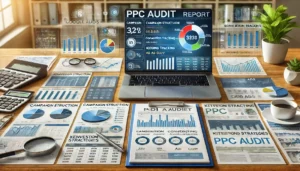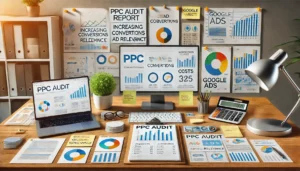Understanding a PPC Audit Report: A Comprehensive Guide

Stay ahead of the curve in digital marketing with high-performing PPC campaigns! Pay-Per-Click (PPC) is a powerful tool for attracting qualified traffic and generating leads. Regular audits are key to keeping your campaigns running smoothly. This guide will unveil the secrets of the PPC audit report, providing a step-by-step approach to understanding its components, conducting effective audits, and transforming insights into peak campaign performance.
Key Takeaways
- A PPC audit report evaluates the performance of PPC campaigns and identifies areas for improvement.
- Key components of a PPC audit report include performance metrics, budget allocation, and ROI tracking.
- Regular PPC audits are crucial for optimising campaign performance and ensuring efficient budget use.
- Advanced tools and techniques can enhance the depth and accuracy of PPC audits.
- Effective communication of audit findings is essential for driving actionable insights and strategic decisions.
What is a PPC Audit Report?
A PPC audit report is a detailed evaluation of your pay-per-click (PPC) advertising campaigns. It aims to identify areas for improvement and maximise the return on investment (ROI) from platforms like Google Ads. A well-executed PPC audit can provide invaluable insights into the overall health of your PPC accounts. This includes reviewing campaign structure, conversion tracking, keyword selection, bidding strategies, and ad copy.
Key Components of a PPC Audit Report
A comprehensive PPC audit report typically includes several key components:
- Campaign Structure: Analysing how your campaigns are organised.
- Conversion Tracking: Ensuring that all conversions are accurately tracked.
- Keyword Selection: Reviewing the effectiveness of your chosen keywords.
- Bidding Strategies: Evaluating your bidding methods to ensure cost-efficiency.
- Ad Copy: Assessing the performance of your ad creatives.
Importance of a PPC Audit Report
Conducting a PPC audit is crucial for several reasons:
- Performance Evaluation: It helps you understand how well your campaigns are performing.
- Identifying Issues: Pinpoints areas that need improvement.
- Strategic Planning: Provides data-driven insights for future strategies.
- Budget Optimisation: Helps in reallocating budget to more effective campaigns.
Common Misconceptions About PPC Audit Reports
There are several misconceptions surrounding PPC audit reports:
- It’s Only for Large Campaigns: Even small campaigns can benefit from a PPC audit.
- One-Time Task: PPC audits should be conducted regularly, not just once.
- Too Complex: With the right tools and guidance, anyone can perform a PPC audit.
Regular PPC audits are essential for maintaining the effectiveness of your advertising efforts. They help you stay ahead of the competition and ensure that your budget is being used efficiently.
The Role of PPC Audit Reports in Campaign Optimisation
Identifying Performance Gaps
A PPC audit report is instrumental in pinpointing areas where your campaigns may be underperforming. By analysing metrics such as click-through rates (CTR), conversion rates, and cost-per-click (CPC), you can identify which elements need improvement. This allows you to make data-driven decisions to enhance your campaign’s effectiveness. For instance, if certain keywords are not generating the expected results, you can either optimise them or allocate your budget elsewhere.
Enhancing Budget Allocation
Effective budget allocation is crucial for maximising the return on investment (ROI) of your PPC campaigns. A comprehensive audit helps you understand where your money is best spent. By identifying high-performing keywords and ad groups, you can allocate more budget to these areas while reducing spend on underperforming ones. This ensures that your advertising funds are used more efficiently, ultimately leading to better results.
Improving ROI Tracking
Tracking ROI is essential for understanding the success of your PPC campaigns. A detailed audit report provides insights into how well your campaigns are performing in terms of revenue generation. By examining metrics like cost per acquisition (CPA) and return on ad spend (ROAS), you can gauge the profitability of your efforts. PPC ad agencies often use these insights to refine their strategies, ensuring that every pound spent contributes to achieving business goals.
Continuous monitoring and regular audits are key to maintaining and improving the performance of your PPC campaigns. By leveraging the insights gained from audit reports, you can make informed decisions that drive better results and higher ROI.
How to Conduct a Comprehensive PPC Audit
Setting Clear Objectives
Before diving into the audit, it’s crucial to set clear objectives. Define what you aim to achieve with your PPC management efforts. Are you looking to increase conversions, reduce costs, or improve ad relevance? Having well-defined goals will guide your audit process and ensure you focus on the most impactful areas.
Gathering and Analysing Data
Data is the backbone of any PPC audit. Collect data from your Google ads PPC campaigns, including metrics like click-through rates, conversion rates, and quality scores. Use tools provided by your London PPC agency or other reliable sources to gather comprehensive data. Analyse this data to identify trends, strengths, and weaknesses in your campaigns.
Implementing Actionable Insights
Once you’ve gathered and analysed your data, the next step is to implement actionable insights. This could involve adjusting your keyword targeting, refining your ad copy, or reallocating your budget. A PPC eCommerce agency can offer specialised advice for eCommerce PPC campaigns. The goal is to make data-driven decisions that enhance your campaign’s performance.
Regular audits and adjustments are key to maintaining an effective PPC strategy. Continuous improvement ensures that your campaigns remain competitive and aligned with your business goals.
Tools and Techniques for Effective PPC Audits
Essential PPC Audit Tools
Running a manual PPC audit can be incredibly time-consuming. However, using the right tools can make your campaigns more effective and less labor-intensive. Some of the best PPC audit tools on the market include:
- Semrush
- Optmyzr
- Wordstream
- Helium10
- Adalysis
Selecting a PPC audit tool that aligns with your campaign goals is vital. A successful PPC campaign audit ensures you allocate your resources to the most profitable areas.
Advanced Techniques for In-Depth Analysis
A good PPC audit analyses campaign settings, costs, ad groups, and ad performance to identify areas of success and areas needing improvement. But a great PPC audit takes it a step further by examining what competitors are doing and making adjustments based on your target market. Consider these advanced techniques:
- Competitor Analysis: Understand what your competitors are doing right and where they are falling short.
- Market Segmentation: Tailor your campaigns to specific segments of your target audience.
- Quality Score Optimisation: Focus on improving your Quality Score to lower costs and improve ad placements.
Automating Your PPC Audits
Automating your PPC audits can save you a significant amount of time and ensure that no detail is overlooked. Tools like Google Ads Scripts and automated reporting features in platforms like Semrush and Optmyzr can help you keep track of your campaigns effortlessly. Google Adwords PPC automation can be particularly beneficial for large-scale campaigns managed by Google ads agencies.
Regular audits and continuous monitoring are essential for maintaining the effectiveness of your PPC campaigns. By leveraging the right tools and techniques, you can ensure that your campaigns are always optimised for the best performance.
Building and Presenting Your PPC Audit Report
Structuring Your Report
Creating a well-structured PPC audit report is crucial for effectively communicating your findings. Start with an executive summary that highlights the key insights and recommendations. Follow this with detailed sections covering each aspect of the audit, such as keyword performance, ad copy analysis, and budget allocation. Ensure your report is logically organized to make it easy for stakeholders to follow.
Visualising Data for Better Understanding
Visual aids like charts, graphs, and tables can significantly enhance the clarity of your report. Use these tools to present complex data in a more digestible format. For instance, a table comparing the performance of different keywords can quickly show which ones are underperforming. Visualising data helps stakeholders grasp the insights more effectively.
Communicating Findings to Stakeholders
Effective communication is key to ensuring your audit report leads to actionable changes. Tailor your language and presentation style to your audience, whether they are marketing experts or business executives. Highlight the most critical findings and recommendations, and be prepared to answer questions. A well-communicated report can drive meaningful improvements in your PPC campaigns.
A comprehensive PPC audit report not only identifies areas for improvement but also provides a roadmap for future success. Make sure your findings are clear, actionable, and aligned with your overall business goals.
Continuous Monitoring and Improvement
Using Dashboards for Real-Time Insights
Dashboards are essential for gaining real-time insights into your PPC campaigns. They allow you to track key performance indicators (KPIs) and make data-driven decisions quickly. Implementing a robust dashboard system can significantly enhance your ability to monitor campaign performance. Use dashboards to visualise metrics like click-through rates, conversion rates, and cost-per-click, enabling you to identify trends and anomalies promptly.
Regularly Updating Your PPC Strategies
To stay competitive, it’s crucial to regularly update your PPC strategies. This involves revisiting your audit data, conducting quarterly pulse checks, and performing annual comprehensive audits. By doing so, you can adapt to changes in algorithms, market conditions, and consumer behavior. Regular updates ensure that your campaigns remain effective and aligned with your business goals.
Leveraging Feedback for Continuous Improvement
Feedback is a valuable resource for continuous improvement. Gather feedback from various sources, including customer reviews, stakeholder input, and performance data. Use this feedback to refine your PPC strategies and address any issues that may arise. Incorporating feedback into your optimisation efforts can lead to more effective campaigns and better ROI.
Continuous monitoring and improvement are vital for the long-term success of your PPC campaigns. By using dashboards, regularly updating strategies, and leveraging feedback, you can ensure that your campaigns remain effective and yield the best possible results.
Conclusion
Understanding the intricacies of a PPC audit report is essential for optimising your marketing campaigns and ensuring maximum return on investment. This comprehensive guide has walked you through the fundamental aspects of PPC audits, from setting goals and using the best tools to interpreting the auditor’s reports and implementing actionable insights. By following the step-by-step checklist and utilising the practical solutions provided, you can identify underperforming areas, optimise budget allocation, and ultimately enhance the efficiency of your PPC campaigns. Remember, continuous monitoring and regular audits are key to staying ahead in the competitive landscape of digital marketing. Equip yourself with the knowledge and tools outlined in this guide, and take your PPC campaigns to the next level.
Frequently Asked Questions
What is a PPC audit report?
A PPC audit report evaluates the performance of your pay-per-click (PPC) campaigns, identifies issues, and suggests improvements to enhance the effectiveness of your campaigns.
Why should I conduct a PPC audit?
Conducting a PPC audit helps you optimise budget allocation, identify underperforming areas, boost campaign efficiency, and improve ROI tracking and accountability.
What are the key components of a PPC audit report?
Key components include performance metrics, budget analysis, keyword effectiveness, ad content review, and recommendations for improvement.
How often should I perform a PPC audit?
It’s recommended to perform a PPC audit at least quarterly to ensure your campaigns are running efficiently and to make necessary adjustments.
What tools can I use for a PPC audit?
Essential tools for a PPC audit include Google Analytics, Google Ads Editor, SEMrush, Ahrefs, and various PPC audit templates and dashboards.
Can a PPC audit improve my ROI?
Yes, a PPC audit can significantly improve your return on investment (ROI) by identifying and addressing inefficiencies in your campaigns.
Author
Search Blog
Free PPC Audit
Subscribe to our Newsletter
The Voices of Our Success: Your Words, Our Pride
Don't just take our word for it. With over 100+ five-star reviews, we let our work-and our satisfied clients-speak for us.
"We have been working with PPC Geeks for around 6 months and have found Mark and the team to be very impressive. Having worked with a few companies in this and similar sectors, I rate PPC Geeks as the strongest I have come across. They have taken time to understand our business, our market and competitors and supported us to devise a strategy to generate business. I value the expertise Mark and his team provide and trust them to make the best recommendations for the long-term."
~ Just Go, Alasdair Anderson




